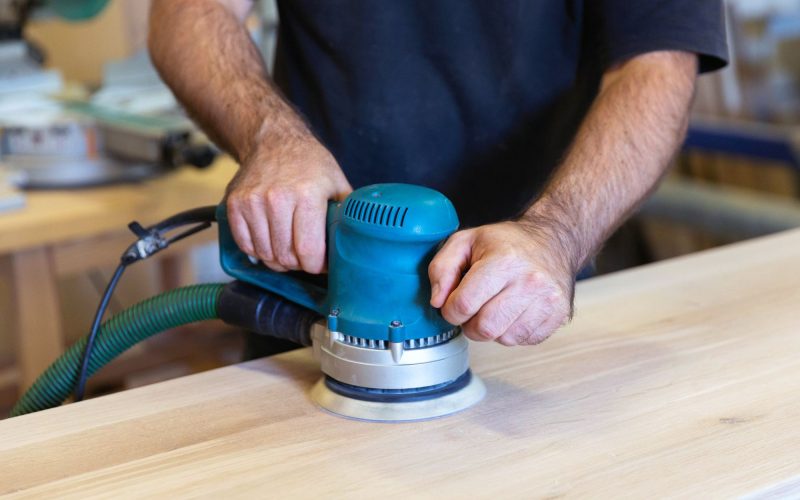There are several ways to become a tool product tester. Although some people naturally have an aptitude for testing tools, others build the skills over time. Nevertheless, becoming a tool tester requires some amount of knowledge and expertise.
Tools are essential components of any tool kit and need special care from a tool product tester. A tool product tester tests and examines different tools, including hand, power, and machinery, for companies that produce and sell them.
Furthermore, a power tool product tester gives feedback concerning the safety, usability, and quality of the tool they test. Then the manufacturers and sellers of these tools use the feedback to improve their products and manufacture new ones.
In addition, power tool product testers are hired based on their knowledge of the tools and experience testing such tools, as well as their ability to give sincere and detailed feedback.
If you are detail-oriented, know various tools, and can provide honest reviews about the devices you use, a power tool product tester is an ideal career path for you.
This article explains in depth what a career in tool testing entails. Read on to broaden your knowledge about this profession!
Table of contents
- Who is a Tool Product Tester?
- Why Does Tool Hire Product Testers?
- Is Tool Product Tester Legit?
- What are the Eligibility Requirements for Tool Product Tester?
- How To Become a Tool Product Tester
- How to Apply to Become a Tool Product Tester
- Do Tool Product Testers Get Paid?
- Are There Available Tool Product Tester Jobs?
- Can I Become a Tool Product Tester From Home?
- What is the Average Salary for a Tool Product Tester?
- Tool Product Tester Program
- Best Tool Product Tester Club
- Tips on How to Get Selected to be a Tool Product Tester
- FAQs
- Conclusion
- References
- Recommendations
Who is a Tool Product Tester?
A tool product tester assesses and tests different tools and equipment used for various purposes, such as manufacturing, construction, DIY projects, and other mechanical or industrial applications.
Further, this tool professional ensures that the tools are reliable, safe, and carry out their primary functions effectively. They usually work with companies that distribute, produce, or design tools and equipment.
They can also work independently as consultants, offering tool testing services to different clients. Tool product testing may involve safety tests, durability tests, and stress tests. It may also include making recommendations for improvements to the manufacturers.
On the other hand, a power tool product tester is a tool product tester that specializes in testing and examining power tools. These professionals often have a mechanics, engineering background, or a related field.
They also profoundly understand power tools’ usage, construction, and design. Their primary duty is to test power tools like sanders, saws, drills, and any battery-powered or electric machine to ensure that they meet safety standards and function effectively and efficiently.
A power tool product tester also evaluates the tools’ reliability, durability, and other essential features. Professionals in this field can work for tool-producing companies, assessing their products before they are launched in the market.
Again, they can work for independent testing agencies or laboratories that offer tool testing services to manufacturers or government agencies. Overall, a power tool product tester ensures that a power tool is safe to use, reliable, and performs its functions efficiently.
They also help you to improve the quality and safety of power tools.
Read Also: How To Become A Yeezy Product Tester In 2024 | Full Guide
What are the Responsibilities of a Tool Product Tester?
As we said earlier, the primary goal of a power tool product tester is to ensure that tools and equipment are safe to use, reliable, and function as expected.
Tool product testers also perform tests on tools to check their performance, safety, and durability. In addition to these primary tasks, a power tool product tester also does the following:
- Performance tests on tools are carried out to check their efficiency, accuracy, and speed.
- They also carry out stress tests to evaluate the durability of tools when subjected to extreme conditions.
- Assesses the safety features of the tools to ensure they meet safety regulations and standards.
- Creates detailed test reports about the testing approach, outcomes, and recommendations for improvement.
- Stays informed about industry trends and the latest tool technology.
- Discovering design flaws and giving recommendations for improvement.
- Works with manufacturers and product designers to ensure the tools meet user requirements.
See Also: How to Become a Cosmetic Product Tester in 2024 | Full Guide
Why Does Tool Hire Product Testers?
Tool or tool-hiring companies hire product testers to ensure the machine they manufacture, sell, or rent to their clients are 100% reliable, safe, and function as expected.
These tool-hiring companies usually have a large inventory of tools they rent to customers for construction, home improvement, DIY projects, etc. Therefore, ensuring these tools are in suitable condition is paramount for customers’ safety and successful projects.
Meanwhile, hiring product testers will help a tool-hiring company discover design weaknesses or safety hazards in the tools it rents to customers.
Also, the various tests on the tools help the company figure out any tool defects and take corrective measures to avoid injuries and accidents when using such tools.
In addition, product testers can give honest feedback on the tools’ usage, durability, reliability, and ergonomics. This helps tool-hiring companies make informed decisions when renting out their machines.
When tool-hiring companies ensure that their tools are top quality and meet safety regulations, they can create a positive reputation and boost customer satisfaction. This will, however, lead to business growth and repeat customers.
Check Out: How To Become An Athleta Product Tester In 2024 | Full Guide
Is Tool Product Tester Legit?
Yes, a career in tool testing is legit. Hence, a tool product tester is legit. These experts play an essential role in the tool industry. Their work revolves around testing tools (including power) for safety, performance, stress, reliability, etc.
Generally, they have a background in mechanics, Engineering, or related fields. They also know how these tools are designed and operated.
Meanwhile, the field of tool testing is highly regulated. Many industry regulations and standards ensure tools are safe and meet quality standards.
So, product testers play a vital role in ensuring that these regulations and standards are followed for the safety and quality of tools used by professionals and other tool users.
Read Also: How to Become a Reebok Product Tester in 2024 | Full Guide
What are the Eligibility Requirements for Tool Product Tester?
The eligibility requirements for tool product testers may differ based on the employer. However, the general eligibility requirements for tool testing positions are as follows:
- Education: A bachelor’s degree in Engineering or related fields is needed, but some positions may require a high school diploma or equivalent.
- Knowledge of equipment and tools: Tool product testers must understand tools’ features, construction, usage, and design.
- Experience: While many positions require experience, others may allow you to learn on the go.
- Detail-oriented: You must be detail-oriented as this will help you identify safety hazards and weaknesses around tools.
- Analytical skills: To effectively perform tool testing, you must possess problem-solving skills. These skills help you identify problems, analyze data, and proffer solutions.
- Understand industry regulations and standards: You must be acquainted with industry regulations and standards relative to tool performance and safety.
- Communication skills: Product Testers must possess good written and verbal communication skills. These skills help them report their findings and offer recommendations to manufacturers.
Besides these eligibility requirements, some recruiters may require that tool product testers have specific licenses or certifications. However, this depends on the tools they test. For instance, professionals working with electrical machines may require an Electrical Safety certification.
See Also: How to be an Ulta Product Tester in 2024 | Full Guide
How To Become a Tool Product Tester
Becoming a tool product tester requires a blend of education, experience, and specific skills. Below is a step-by-step guide on how to become a power tool product tester.
#1. Understand how tools work.
To become a tool product tester, you must first have a solid understanding of how tools work. It is essential to know how to identify the various parts of a tool and their functionality. In addition, you also need to be familiar with the different types of tools that are available on the market.
#2. Acquire relevant education.
Many tool product testing roles require that you possess a Bachelor’s degree in Engineering or a related field. Meanwhile, you can take product design, materials science, and mechanics courses. These courses will help you build a solid foundation in the principles of product testing.
#3. Build relevant skills.
The next step to becoming a tool product tester is building relevant skills. As an aspiring tool product testing professional, you should understand tools’ performance, construction, and design.
Therefore, you must develop communication, problem-solving, analytical, and attention to detail skills, which are necessary to succeed in a tool product testing position.
#4. Gain licenses or certifications.
Another thing that will make you stand out is gaining licenses or certifications. You can take up licenses or certifications in Occupational Safety and Health Administration (OSHA) or Electrical Safety. In addition to showcasing your expertise in the field, this will boost your chances of getting hired.
#5. Gain experience.
Most tool product testing positions need you to have experience in a related field. Thus, you can gain experience through entry-level mechanics or engineering roles, apprenticeships, and internships.
#6. Research about tool product testing positions.
Look for tool product testing opportunities with government agencies, manufacturers, or independent testing laboratories. You can also search company websites and job boards for job postings on tool product testing.
#7. Apply for product testing roles.
Apply for tool product testing roles that suit your skills, experience, and qualifications. Narrow your cover letter and resume to showcase your relevant/top skills and experiences.
#8. Stay updated.
Ensure you stay updated on the latest industry regulations and standards for tool safety and performance. Attend seminars, workshops, or training sessions to broaden your expertise and knowledge.
These are the steps required to become a tool product tester. If you follow them and continually develop your skills and knowledge, you will skyrocket your chances of succeeding in this career path.
Check Out: How to Become a Puma Product Tester in 2024 | Full Guide
How to Apply to Become a Tool Product Tester
Follow the steps below to apply to become a tool product tester.
1. Research potential recruiters.
The first step for a tool product tester application is researching companies that produce equipment and tools. Afterward, visit their website to check for job openings in tool product testing. You can also search online platforms, social media, or job boards for open positions in this field.
2. Ensure your resume is ready.
Prepare your resume to highlight your skills, education, and experiences relevant to tool product testing. Remember to include any licenses or certifications you have gained concerning tool product testing or safety.
3. Submit your application.
The next step is to submit your application, ensuring it follows the recruiter’s instructions. You may be asked to submit an online application form or supplementary documents, depending on the company.
4. Follow up.
If you don’t get feedback from the recruiter within a few weeks of submitting your application, follow up by email or phone to find out its status.
5. Get ready for your interview.
If you are shortlisted for an interview, prepare by researching and familiarizing yourself with the company. Find out what equipment/tools they manufacture or distribute.
At the same time, prepare to answer questions about your qualifications, experience, and knowledge of product testing.
6. Accept the offer.
Accepting the offer is the final application step for a tool product tester role. If you’re given the position, review the terms of employment, benefits, salary, and work schedule before accepting it. If you take the offer, fill out any additional paperwork and supply any extra information your employer requires.
Tool product tester application requires a well-drafted resume and cover letter showcasing your qualifications, experience, and skills. If you follow the steps above and are persistent with your search, you will improve your chances of getting a tool product testing role.
Read Also: How To Become A Hair Product Tester In 2024 | Full Guide
Do Tool Product Testers Get Paid?
Yes, tool product testers typically get paid for their work. The amount they receive can differ based on the employer, the product tester’s qualifications, specific responsibilities, and experience level.
While some are paid hourly, others receive salaries or a flat rate for their services. They may also receive benefits alongside their base pay.
These benefits may include retirement savings plans, paid time off, health insurance, etc. Generally, the pay for a tool product tester differs. Hence the importance to research the opportunity and employer to find out the payment plan/package for your role.
Are There Available Tool Product Tester Jobs?
Yes, jobs are often available in the tool product tester field, especially in construction and manufacturing companies. However, the availability of these jobs depends on the location, company, and economic condition.
If you’re seeking tool product tester jobs, visit industry-specific job sites and companies’ websites and search online job boards. In addition, you can network with experts in the field and attend career events or job fairs. Also, you can directly contact tool distributors or producers to ask about job openings.
Although several tool products tester jobs are available, securing a role may require persistent effort and your willingness to research and apply to many job openings.
Meanwhile, here are ten tool tester jobs available:
Power tool product tester
A power tool product tester checks the safety and performance of tools like grinders, drills, sanders, and saws. They test the tools’ power, safety features, and accuracy and then return feedback to the manufacturer of such machines.
Electrical tool tester
An electrical tool tester tests the safety and performance of tools used in electrical works. Such machines include multimeters, crimpers, and wire strippers. They also check for the functionality, accuracy, and safety of these tools alongside recommending improvements to their manufacturers.
Hand tool tester
A hand tool tester assesses the quality and performance of tools like pliers, screwdrivers, wrenches, and hammers. They evaluate hand tools’ safety, functionality, and durability and recommend design improvements to their manufacturers.
Construction tool tester
Construction tool testers check the quality, safety, and performance of tools used in the construction industry. These machines include cement mixers, ladders, scaffolding tools, and others. Additionally, they evaluate the functionality and durability of these tools and give feedback to their producers.
Hand-held power tool tester
The hand-held power tool tester tests the performance, quality, functionality, safety, and durability of portable power tools like angle grinders, impact drivers, and cordless drills. It also evaluates the battery life and provides reports to the manufacturer.
Automotive tool tester
An automotive tool tester checks the durability, functionality, performance, quality, and safety of tools used for automotive repairs. Such machines include diagnostic equipment, wrenches, jacks, etc. Furthermore, they evaluate their accuracy, safety features, and ease of use and provide reports to the manufacturer.
Garden tool tester
These professionals test the quality, performance, safety, usage functionality, and durability of garden tools such as leaf blowers, hedge trimmers, lawnmowers, etc. They also evaluate the tools’ effectiveness and efficiency.
Material-handling equipment tester
They test the safety, quality, durability, functionality, ease of use, and performance of equipment that carries heavy materials, such as cranes, pallet jacks, forklifts, etc. Afterward, they recommend improvements to the producers.
HVAC tool tester
These individuals test the durability, functionality, safety, performance, effectiveness, and efficiency of tools used for air conditioning, ventilating, and heating work. Such tools include leak detectors, vacuum pumps, refrigerant gauges, etc.
Welding tool tester
These tool testers assess the accuracy, functionality, safety, and performance of welding tools such as safety equipment, welding torches, and welding machines.
See Also: How to Become an REI Product Tester in 2024 | Full Guide
Can I Become a Tool Product Tester From Home?
It is often impossible to become a tool product tester from home. The reason is that tool product testing usually requires practical experience with equipment and tools. And you cannot do this from home.
Tool testers are responsible for testing machines and physically evaluating their safety, durability, and performance. They also submit reviews/reports to the manufacturer. However, this can only be done in a real-world environment like a workshop or laboratory.
Some companies may provide remote work openings for specific product testing tasks, such as quality control, report writing, and data analysis. These roles may require a background in product testing.
At the same time, remote tool product testing positions are rare and can only be found in specific industries.
What is the Average Salary for a Tool Product Tester?
The average salary for a tool product tester varies considerably based on experience level, location, industry, skills, and qualifications. According to Glassdoor, the average pay for a tool product tester in the US is estimated to be $42,657 annually.
Moreover, this ranges from $37,000 to $56,000 yearly based on the person’s experience level and the industry where they work. Additionally, most tool product testers receive incentives like profit sharing, bonuses, etc. But this depends on the success of the products they test
Other companies may give extra benefits like paid time off, retirement plans, or health insurance. Meanwhile, entry-level tool product testers may pay less than the average salary for this field.
At the same time, experienced tool testers or professionals with specialized knowledge may earn higher than the average base salary. Generally, a tool product tester’s pay can differ based on various factors. Therefore, you must negotiate your pay based on your qualifications and experience.
Check Out: How To Become A Makeup Product Tester In 2024 | Full Guide
Tool Product Tester Program
Applying for tool tester programs can help you become a tool tester. Some of them include:
- Milwaukee Tool Test and Measurement Program
Milwaukee Tools manufactures hand tools, accessories, storage and personal protective equipment, and heavy-duty power tools. The company’s tool product testing program is open to individuals willing to test and give reports on new tools in the company’s Test and Measurement department.
- Craftsman Test Panel
Craftsman is a tool company that manufactures lawn and garden equipment and work wear. And their tool testing program is available for individuals interested in working in this company category. Participants of this program get free products for their feedback.
- DeWalt Product Tester Program
This is among the top hand and power tools producers. You can apply to be a DeWalt tool tester via their website. Then you will be allowed to test products and return feedback.
- Bostitch Product Tester Program
Bostitch’s tool testing program allows interested individuals to test and return reports on new Bostitch tools. Meanwhile, you will be given free Bostitch products for your feedback.
- Ridgid Experience Program
Ridgid, an HVAC and plumbing tools manufacturer, organizes this program. Again, this program’s participants must test new Ridgid tools and give feedback. Additionally, they receive gifts for their feedback.
Research them before participating in these programs to know their benefits and requirements.
Best Tool Product Tester Club
Below are the best tool tester clubs you can join:
- Fine Homebuilding Tool Testers Club: This club by Fine Homebuilding is for people willing to test tools and give reports on new accessories and tools.
- Lowe’s Product Review Program: At Lowe’s Product Review Club, customers can test and review products while reporting sincere feedback. These products could be appliances, tools, and other home improvement equipment.
- The Family Handyman Product Tester Program: The Family Handyman runs a product testing club for people interested in testing and giving reports on tools and accessories.
Also Read: How To Become An Under Armor Product Tester
Tips on How to Get Selected to be a Tool Product Tester
Check out these tips on how to get selected to be a tool product tester:
- Register for product testing programs: Search for tool manufacturing websites, companies, and distributors that provide product testing programs. Then register for them.
- Draft a detailed resume: Ensure you draft a well-detailed resume and highlight your relevant skills, experience, interests, and background with tools.
- Give honest feedback: Provide thorough feedback/reviews about the tools you tested. Ensure your review includes positive and negative aspects of the devices.
- Show up on social media: Always share your feedback on social media platforms like Facebook, Twitter, and Instagram. To improve visibility, tag the company or distributor in your post.
- Join a community of product testers: Network with your colleagues by joining online groups and forums about tool testing.
FAQs
Testing a product before launching it is called Test marketing.
A good product tester performs thorough testing and is honest and concise in their feedback.
The four basic testing methods are acceptance testing, component/unit testing, system testing, and integration testing.
Quality assurance (QA) product testing involves ensuring that your product is of the highest possible quality and provides the best user experience for your customers.
Conclusion
Tool product testers are essential in the tools industry because they ensure they are durable, reliable, and safe. Furthermore, these experts help improve tools’ functionality, efficiency, and quality before launching them for public use.
To become a good tool tester, you must be passionate about tools, possess good communication skills, be detail-oriented, have relevant qualifications & experience, and be able to adhere to instructions.
Generally, tool testing is a promising career that allows you to assess and test tools to improve the quality of the tools you use.
References
- cgaa.org – How to Become a Power Tool Tester?
- ereplacementparts.com – How to Test Power Tools With & Without A Multimeter
- indeed.com – How To Become a Product Tester at Home (With Tips)




